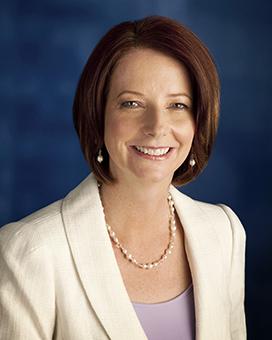On this page
1990 to 1999
3 Oct 1998: 1st elected to Federal Parliament
Rudd was elected as Member of Parliament for the seat of Griffith (Qld), in the 39th federal election.
2000 to 2009
4 Dec 2006: Labor leader
Rudd defeated Kim Beazley in a leadership ballot and became leader of the parliamentary Labor Party and Leader of the Opposition.
3 Dec 2007: 26th Prime Minister
Following Labor’s victory in the 42nd federal election, Rudd was sworn in as prime minister. The new Labor Cabinet included Julia Gillard, Australia’s 1st deputy prime minister.
3 Dec 2007: Signing Kyoto
Australia signed the Kyoto Protocol, the international agreement to limit greenhouse gas emissions passed by the United Nations in 1997.
13 Feb 2008: Welcome at last
The opening of Australia’s 42nd parliament was a milestone in Australian political history – the 1st to be preceded by a welcome to country from local Aboriginal people.
14 Feb 2008: A nation moved
Crowds around Australia watched broadcasts from the House of Representatives when Rudd led a parliamentary apology for the effects of past government policies on Indigenous people.
19 Apr 2008: 2020 vision
1000 participants gathered at Parliament House for a 2-day Australia 2020 Summit organised by the government to generate ideas and strategies.
8 Aug 2008: Olympiad
Rudd and wife Thérèse Rein attended the opening of the 29th Olympic Games in Beijing. They had been in China earlier that year during an official world tour.
5 Sep 2008: 25th Governor-General
Formerly the Governor of Queensland from 2003 to 2008, Quentin Bryce was sworn in as Governor-General, the 1st female to hold this office.
16 Sep 2008: Global Financial Crisis
United States investment firm Lehman Brothers files for bankruptcy, triggering panic on the global financial markets. A massive contraction of credit caused many developed economies to slide into deep recession. The Rudd government started a large program of stimulus spending, helping Australia to avoid recession in 2008-09.
21 Jan 2009: President Obama
Barack Obama, the 1st African-American president of the United States, is inaugurated.
7 Feb 2009: Black Saturday
Bushfires in northern Victoria take 173 lives and destroy 2000 houses and 4500km2 of land, exceeding the record of Australia’s deadliest bushfires, the 1983 'Ash Wednesday' disaster.
31 Mar 2009: GFC, the G7 and the G20
Australia's more favourable performance during the Global Financial Crisis (GFC), when all the G7 economies contracted, enabled the formation of a wider international body, the G20.
1 Dec 2009: New Liberal leader
Tony Abbott became Leader of the Liberal Party and Leader of the Opposition after a Party room vote against Malcolm Turnbull.
2010 to 2019
1 Jan 2010: Fair Work program
The Howard government's controversial Work Choices is replaced with the Fair Work program, a substantial change in industrial relations processes.
24 Jun 2010: Lost office
Rudd faced increasing criticism from within government. Julia Gillard asked that a leadership ballot be held. Rudd initially stood, but stood down when he realised he did not have the support to win. Gillard won leadership of the Labor Party, and became the Prime Minister.
27 Jun 2013: Prime minister for the 2nd time
Facing criticism and division within the government, Prime Minister Gillard announced a leadership ballot on 26 June. Rudd was re-elected as the leader of the Labour Party, and sworn in as prime minister on 27 June. He was the 2nd Labor prime minister to serve a 2nd non-consecutive term.
7 Sep 2013: 44th federal election
Rudd’s Labor government was defeated by the Liberal-National Party Coalition under Tony Abbott.
18 Sep 2013: Left office
After Labor’s defeat in the 44th federal election, Rudd resigns as prime minister and Tony Abbott is sworn in.
22 Nov 2013: Left Parliament
Rudd resigns from Parliament.





